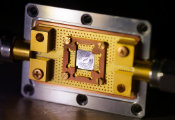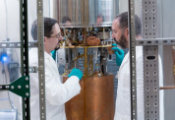The SuperC Consortium Tries to Find a Material That Is Superconducting at Room Temperature
February 05, 2025 -- The global SuperC consortium wants to realize a superconductor capable of operating at room temperature within a decade. If all its objectives are met, it will have a huge impact on global energy consumption. Grand challenges such as achieving room-temperature superconductivity require a truly collaborative approach. The project will be done by a consortium of 11 top-level research teams from universities in Finland, including University of Jyväskylä, EU and USA. SuperC is coordinated by Aalto University in Finland.
Superconductivity is a quantum phenomenon in which all electrical resistance and energy loss disappear inside a material that is cooled to ultra-low temperatures. This saves energy since less is needed to power the device. The phenomenon is utilized in large magnets, medical imaging, and quantum devices, and it could be used to drastically reduce the energy consumption of classical computers.
But there is an issue. Achieving superconductivity in its present-day applications requires cooling materials down to near absolute zero in expensive facilities with scarcely available natural resources like helium. It also involves sizable energy consumption by itself.
Research at the University of Jyväskylä focuses on nanoscale devices
At the University of Jyväskylä, superconductivity research is theoretical and related to the study of quantum phenomena in small nanoscale electron systems. This project utilizes new theoretical discoveries, related to superconductivity and quantum geometry, that have attracted great attention in the scientific community, as well as newest machine learning and experimental methods.
- Our novel approach for finding superconductors may also turn out to be extremely powerful in designing and finding other new materials. It is a highly promising approach, but requires large-scale global collaboration, says professor Tero Heikkilä from University of Jyväskylä.
New funding enables room-temperature superconductivity
Now the SuperC consortium have secured highly competitive funding aimed at unlocking a potential solution: ambient room-temperature superconductivity. With the new funding, the SuperC study how the novel mechanism for increasing the operating temperature of superconductors, suggested by researchers in Finland, can be combined with machine learning to find new superconducting materials that work at higher temperatures.
If it were discovered that some materials became superconducting at higher critical temperatures at ambient pressure, many of the hurdles preventing the technology’s proliferation would be overcome. The result could be a revolution of the ICT sector that sees its energy consumption plummet, as well as boosts to quantum technology and the production of clean fusion energy that uses superconducting magnets.
The research is partially powered by a four-year collaborative grant provided by the Simons Foundation. Titled ‘Simons Collaboration on New Frontiers in Superconductivity’, it involves seven SuperC scientists for a total of 18 researchers from seven countries. The collaboration aims to develop a new and comprehensive theoretical understanding that goes beyond the current superconductivity theory. The collaboration is headed by Professor B. Andrei Bernevig at Princeton University.
The consortium has also secured substantial funding by two Finnish foundations: the Jane and Aatos Erkko Foundation has granted 2 million euros; and the Keele Foundation, founded by Mika and Anu Anttonen, an additional 695 000 euros. The Keele Foundation has also just awarded 85 000 euros in continued funding to the consortium.
- Grand challenges such as achieving room-temperature superconductivity require a truly collaborative approach; one that unites top scientists with diverse expertise, outstanding administrative assistance, and strong support from the universities’ leadership. We have all that. With team spirit and hard work, we will succeed, says professor Päivi Törmä from Aalto University.




































